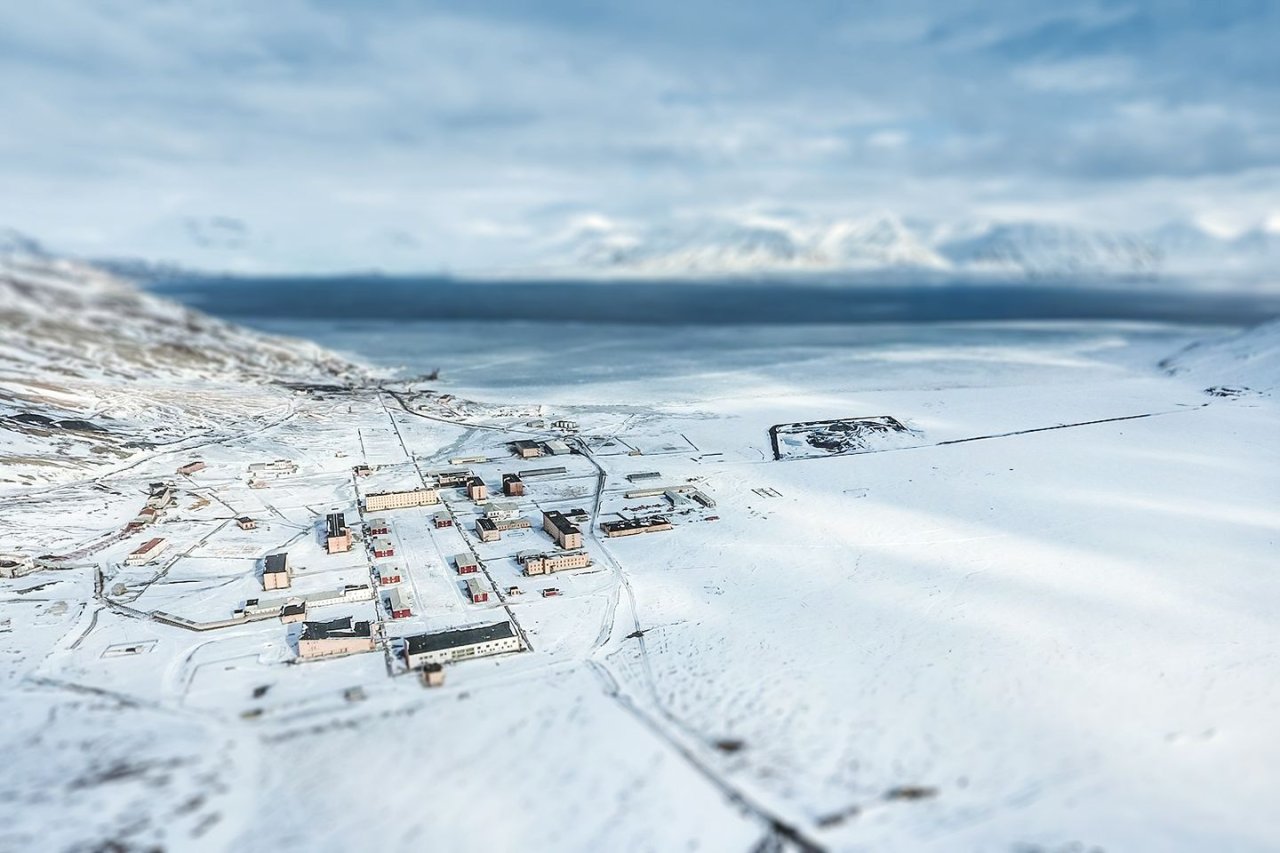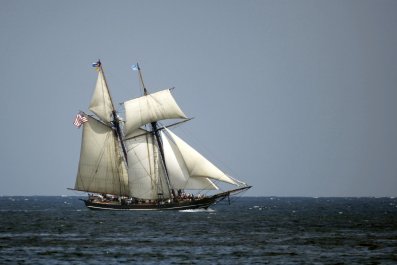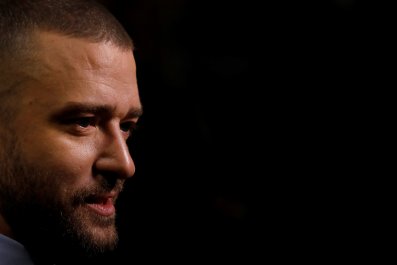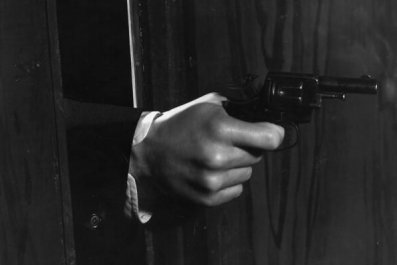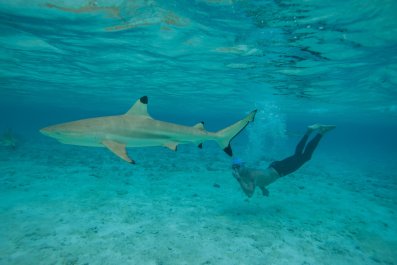Things get stranger the farther away you are from home, and wherever you come from, there's nowhere farther than the North Pole. That's where Longyearbyen is located. It somehow resides on an Arctic Ocean archipelago called Svalbard. More than 2,000 residents live here, including hundreds of children who were rescued from abusive homes. Everyone here is subject to Norwegian law—and some bizarre restrictions, including one that prohibits death.
You can't die in Longyearbyen, but the place is constantly trying to kill you. Every year, the permafrost expands at a rate of about 4 centimeters, and with it, the graves of virus-ridden corpses (apparently death wasn't always against the law). The climate keeps the bodies from decaying, to the delight of the few animals that can survive the Arctic winter, namely the carnivorous—and surprisingly swift—polar bears, which are why you're required to carry a rifle at all times.
I arrived here at the end of October, the last leg of an Arctic journey with a friend, during the long polar nights. For months, darkness blankets the sky, save for the green-red glow of the northern lights.
The town is erected on an immense ice cube, located between twin icy peaks. There are barely any shops or buildings, and the few that exist sell a bit of everything: You can rent a Mauser rifle at the clothing store and send a letter at the supermarket. All products have to be imported—from salt to brandy—thanks to a climate that kills even the most tenacious plants. What's also here is the Svalbard Global Seed Vault, a futuristic, underground bunker that stores millions of seeds from around the world—and is capable of surviving a nuclear holocaust.
There was no such extinction-level event while I was in town, but not long after I arrived, my companion came down with a severe fever. Longyearbyen is home to the northernmost medical center on Earth. But since death is not an option, if you get really sick, you'll kindly, but firmly, be escorted back to the Norwegian mainland, which is what happened to my friend.
Shortly after he departed, I wandered aimlessly around town until I found a cognac bar tucked away in a building. The owner is an Irish hipster with prison tattoos and a life story that ended in disappointment. Here, everyone seemed to have their own mysterious reason for leaving civilization behind.
After a few drinks, I walked toward the pier, where a small group of tourists were boarding a boat. I asked the guide where they were headed. "We are sailing to Pyramiden," she replied, "the lost Arctic city."
I had never even heard of Pyramiden. But since most of Longyearbyen's tourist attractions are closed during the dark polar months, and it was the final day of my trip, I decided to join the group—a few tourists and the Filipino crew.
On the way to Pyramiden, we stopped for lunch: minke whale steak and some million-year-old ice chunks that cooled my glass of 18-year-old Macallan whisky. "It's the purest water on Earth, but it's also devoid of any nutrients—even vitamins," a Filipina boat worker told me. "So if you live here and sustain yourself from these ice waters, you'll need to take pills."
Not long into our six-hour sojourn, we lost all means of communication, and our only entertainment was the whales and walruses escorting us through the icy blue waters.
As we approached Pyramiden's port, our Scandinavian guide gave us a stern lecture and two hours to explore. "Please stay close," she said. "You must keep in line with the local representative's instructions and are forbidden from entering, exploring or touching anything, other than what he shows you. I'll be staying on the boat, so please follow these rules carefully, as you are now entering Soviet sovereignty."
"Don't you mean Russian?" I asked.
"No," she replied, forcing a smile. "Soviet."
Back to the USSR
There are only three people who live on Pyramiden, and one of them was our tour guide for the afternoon. Ivan, a 7-foot-tall, bald Ukrainian with a blond Viking-warrior beard and penetrating blue eyes, looked as wild and mysterious as the place he inhabited. He wore thermal military gear, carried a rifle and a handgun and had rounds of 8 mm bullets slung across his chest.
We met Ivan at the entrance to the town, near a tall, red triangular monument that displayed the town's name in Russian and English. Behind it, a narrow valley unfolded, sheltered by icy peaks that cast a strange shadow over the dozens of buildings that composed the settlement.
Ivan took us around the central plaza. His manner and bearing were very Russian: He didn't try to be nice or accommodating. Instead, he saw the tour as his patriotic duty, one he carried out with the utmost sincerity. His Russian accent didn't mix well with the Macallan, so I barely understood a word he was saying. He was persuasive nonetheless.
What I gleaned is that the Swedes created Pyramiden in 1910 as a coal-mining station and named it after the surrounding glaciers, which resemble the Giza pyramid complex of Egypt. Not long after its inception, the Swedes abandoned the station due to the harsh climate, selling it to the Soviets 17 years later.
During the 1940s, the Soviets decided to turn Pyramiden into a settlement, sending 1,000 men, women and children to tame this Arctic frontier. They designed buildings, paved roads, mined coal and brought sand and grass from Siberia. Why the Soviets did this is still a mystery. Some of it had to do with the grandiosity of imperialism; if the USSR could conquer the Arctic, surely it could conquer anything. The settlement's proximity to North America, some say, made it a strategic foothold for intelligence gathering or maybe even a surprise attack. Others have wondered if the site was a spy training facility or a secret testing ground for unconventional weapons.
Whatever the reason, surviving here demanded creativity and endurance. Bound by nature but free from politics, this Soviet ice colony endured and even prospered for more than four decades. In 1998, years after the collapse of the USSR, residents of Pyramiden abandoned it. The coal mine, apparently, wasn't profitable. But then, it had never been profitable. I wondered what really caused them to leave. What had turned this place into a ghost town, a time capsule of its Communist past?
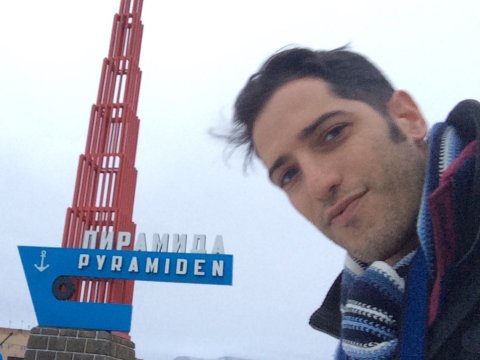
As we continued our tour, I noticed the relics around us: wooden cabins along the main boulevard that housed the settlement's bachelors, as well as a grand, Soviet-style building called the "Mad House," where families had lived. (The children's laughter and screams apparently inspired its nickname.) Art nouveau buildings—all exquisitely preserved—checkered the main road, housing a dining hall and a "culture palace," which boasts a grand piano Ivan called "Red October." There was also a school, a hockey field and an indoor swimming pool. Nearby, a coal mine train track connected the base of the settlement to the peak of the northwestern glacier. In the town's center was a statue of Vladimir Lenin, his squinting eyes fiercely inspecting this Arctic riviera. Behind Lenin was an enormous building, an old government headquarters, which I suspected was used for intelligence purposes.
Ivan continued his spiel, and maybe it was the Macallan wearing off, but I slowly began to understand what he was saying. "Pyramiden was meant to be the utopian Soviet society," he said, a place "where any foreigner could come without a visa, serving as an exhibition of the Soviet Union at its best and proving that not only can Communism work, but it can be a true heaven on Earth."
The group took selfies with Lenin, but I couldn't help but snicker.
"Why do you laugh?" Ivan scolded me. "This is our great culture."
"Oh, no, comrade!" I reassured him. "I was told that if I travel far enough north, I might encounter Santa Claus and his reindeer. But it seems that the exact opposite is true. If Santa Claus is a symbol of excessive capitalistic consumption, a statue of Lenin is surely the antidote!"
Ivan was not amused and hurried us along on the rest of the tour. If the outside of the buildings seemed like a quaint, Communist museum, the inside of these buildings looked like the set of a Soviet horror film: There was a children's nursery with rows of beds, a chamber pot under each, and tiny pairs of perfectly arranged children's shoes. The classroom's desks were piled with books and pencils, Soviet comics and half-finished math exercises, as if a fire alarm had interrupted them mid-class, and everyone had fled.
"Why would you live in this freezing, lonely no-man's-land?" I asked Ivan.
"We are not alone," he replied. "There are thousands of angry polar bears all around us."
Our tour ended at the Pyramiden Hotel, a stylish building with a lobby painted Stalin red. There's a small, lavish bar here, which Ivan and company recently renovated after a polar bear broke in and drained the beer supply. Or so he said.
Working the bar was a 19-year-old Russian in a black bowtie and vest, whom Ivan warmly referred to as Tom Cruise. He did vaguely resemble the actor, and his outfit seemed oddly natural considering the circumstances. Though he wears it for only half an hour each month, he took great pride in his work and presentation. Tom Cruise didn't speak a word of English—nor did the third "Soviet" on the glacier, a 50-something cook named Irena—but when I pointed at a strange bottle distilled with a suspicious root, he said, "Chrain," a word I knew from my Polish-Israeli grandmother. Chrain is a locally distilled horseradish moonshine, and it's a perfect cure for both freezing weather and homesickness.
After a few shots, Ivan encouraged the group to gear up and leave the hotel for our long journey back to Longyearbyen. Everyone seemed thrilled to leave, but I was still intrigued by Pyramiden, by its history and purposes. For Russia to keep its sovereignty over Pyramiden, Ivan had told me, at least two citizens had to live here at all times. But why would Moscow care about this frozen Soviet graveyard? Was there oil here? Gold? Some sort of hidden secrets they needed to protect?
I wanted to find out.
Hair of the Polar Bear
These questions swirled through my mind, mixing with the horseradish liquor, as Ivan walked the rest of the group out to the bus to take them to boat. I stayed behind. He found me on the couch and promptly told me to leave. As he spoke, he kept his hands firmly gripped on his rifle. The next boat, he explained, wasn't scheduled to arrive for days.
"No, thanks," I said. "I think I'll stay."
"What?" he exclaimed. "You can't stay. There's no one here besides the three of us Soviets, and there's limited supplies and no contact with the outside world. I speak some English—but my comrades can't make out a word. There's nothing here for you."
I didn't care, and the bus left without me. Ivan muttered something in Russian and looked at me with contempt. The only word I could make out was "Jid"—an old Russian anti-Semitic slur.
Trapped in a remote, Arctic outpost, completely dependent on wild armed men who saw me as an unwanted nuisance at best, I did the only sensible thing I could think of: I ordered several rounds of horseradish shots until the bottle was empty, and Ivan, for the first time, released a grin.
"There's a custom in the most northern parts of world," he said, "that you have to drink a shot at the same levels of alcohol as your latitude line. The higher and colder you are, the stronger the shot—and it doesn't get any higher than here. So I told Tom to pour you an Arctic shot," otherwise known as a "see you tomorrow" cocktail.
Tom Cruise obeyed and mixed together some blue, green and red spirits. I can hardly recall the hours that followed.
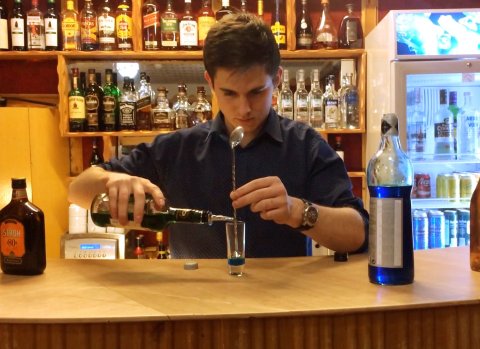
I woke up in the dark, in a strange room, with a pounding headache. My room had no phone, and the windows were covered. The air was cold, and I felt like I was trapped in a strange lucid dream from which I couldn't wake. I stepped outside into the hallway and began knocking on doors along a crimson corridor, trying to find my Soviet hosts. Confusion turned to panic, as I went floor to floor; I must have knocked on hundreds of doors. The place was completely abandoned (my new comrades apparently slept elsewhere).
Eventually, I made it down to the lobby and approached the bar, hoping that the hair of the polar bear would warm me up and cure my hangover. That's where I saw a rifle and a set of keys, tempting me to freely explore the secrets of Pyramiden, without restrictions or censorship, protection or common sense. Exploring the town on my own was both a safety risk and a legal offense—and spending the rest of my life in a Russian prison seemed no less intimidating than ending it as polar bear borscht. I grabbed the keys and the rifle, zipped up my snowsuit and stepped out onto the frozen tundra.
Instantly, the pitch-black Arctic cold seemed to swallow me whole. I walked down the road to the Mad House, where the corridor walls were decorated with posters of Russian knockoff Disney characters, and the rooms displayed family photos of children spinning on a merry-go-round, adults playing cards, couples dancing or playing in hockey tournaments. I even found some Playboy magazines hidden in makeshift wooden closets. Everything was a reminder of the life that once bubbled through these now-deserted halls.
I was most intrigued by the building I suspected was the local KGB headquarters, so I started crossing the central boulevard toward Lenin's statue. Suddenly, a radiance pierced the darkness, and the northern lights appeared, dozens of shooting stars flying horizontally toward one another, until a green web glowed in the darkness. Pyramiden twinkled with delight, and even Lenin seemed content. I felt magnificently solitary, like the universe had granted me a private show.
As I soon discovered, however, I wasn't alone.
Behind Lenin's Back
As the green lights waned, the first roar penetrated the silence. It was frightfully close, but I couldn't tell exactly where it was coming from. I was stuck at the end of the world, cowering behind Lenin, hoping this great statue might serve as a scarecrow. I quickly remembered this was futile; polar bears can smell a person with deadly precision. They can sprint at speeds of up to 25 miles an hour, and the only way to survive their attacks is to shoot them or quickly find shelter.
I tried to recall my military training. I slid bullets into the chamber of my weapon, pointing it into the darkness. But even the Israeli army isn't paranoid enough to prepare its soldiers to fend off an army of murderous polar bears. I waited, frightened dizzy and numb, for what felt like an hour. A strange, suffocating fatigue crept over my body. I considered praying, but it was impossible to do so properly. Jews have different prayers for each part of the day. We also have to face Jerusalem. But here, in this godforsaken limbo, where the sun doesn't rise or set, where time zones converge in any direction you go, such a task was impossible.
My best chance was to try to reach the hotel. I barely managed to take a step, when the roar returned, 10 times louder, from the direction of the Mad House. I pointed the rifle toward the sound, and then I heard a third roar, this one more threatening than the ones preceding it. For the first time, I could see a shadow through the darkness, sprinting across the boulevard. The hotel, I realized, was too far away. The only place I could safely go was the "administrative building." I ran toward it and fumbled with the keys. My fingers felt frozen. The roars grew louder, and none of the keys seemed to fit. Fearing for my life, I rammed my shotgun through the window of the building, shattering the glass.
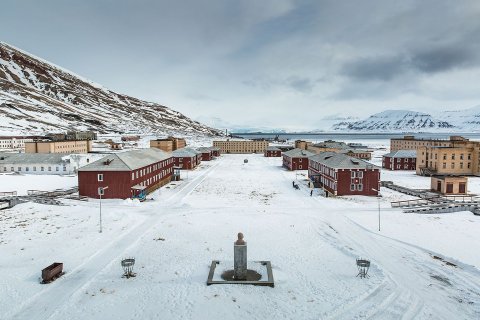
I stepped inside and quickly raced up the stairs, past the Soviet propaganda posters decorating the first floor. I opened a heavy wooden door and entered a room where a painting stared at me from the corner—human skull painted on a black silk cloth. On the back of the door, there was a triangle drawing connecting the settlement's structures. The building where I had fled was at the tip of the triangle. Above the pyramid outline, an eye-shaped figure was drawn around the highest structure in Pyramiden—the top of its coal mine. Finally, I thought, some clues. But what did they mean?
The next rooms contained stacks of documents and books, along with predicate-logic equations scrawled on the walls. Among them was a quote in English by Friedrich Nietzsche that still haunts me:
"What did we do when we unchained the Earth from its sun? Whither is it moving now? Whither are we moving now? Away from all suns? Are we not perpetually falling? Backward, sideward, forward, in all directions? Is there any up or down left? Are we not straying as through an infinite nothing? Do we not feel the breath of empty space? Has it not become colder? Is it not more and more night coming on all the time? Must we not ourselves become gods simply to be worthy of it? There has never been a greater deed; and whosoever shall be born after us—for the sake of this deed he shall be part of a higher history than all history hitherto."
Hours later, I crept back through the darkness and returned to the hotel. I was tired. I was freezing. But I had not been eaten alive.
'You Play Like a Jew'
"Zavtrak, Zavtrak," said the voice behind my door. It was Tom Cruise, urging me downstairs to eat some of Irina's food—buttery porridge, cold cuts, a Russian salad and raspberry juice.
"Good morning," Ivan said, smiling. "How did you sleep?" I desperately wanted him to translate some of the writings I uncovered from the night before. I also wanted him to take me to the coal mine. I knew he wasn't likely to agree, so I decided to try to get him drunk. Again. I spotted a deck of cards on a nearby coffee table.
"Durak?" I said.
Tom Cruise jumped up from his seat and looked at me with disbelief. Ivan seemed delighted too. "You know Durak? Well, why the hell didn't you say so sooner? You don't need to speak Russian to get along with Russians—you only need to drink well and play Durak."
"Let's pour a morning cocktail and break the deck," I said. "The winner can ask the loser for anything he wants."
Durak means "idiot" in Russian, and like anything Russian, there are no winners. Drinking and insulting one another are an important part of the game. So we passionately obliged.
"You play like a Jew," Ivan grumbled.
"Well, so did Jesus."
"We're not that big on Jesus in the old Soviet Union."
"Fine, then let me play cards like a typical Jew while I'll let you play racist like a typical Ukrainian."
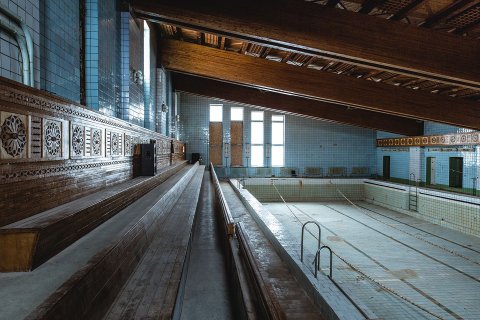
"You have big balls for someone circumcised."
"I'll drink to that."
"So will I."
"I'll drink to your mother too."
We drank and laughed as Tom Cruise begged for translation.
Soon, we had polished off another bottle of Arctic hooch, and I asked Ivan to take me through the coal mine, where I hoped to finally understand the purpose of Pyramiden, whether it really was a secret intelligence outpost or just an old Soviet coal miners' town at the end of the world—a place where remarkable people were sent by their empire to live, love and die, defying nature by reaching past their human potential.
But Ivan demurred with a devious smile.
"I'm sorry, comrade," he said. "The top of the mine is dangerous. It could collapse. It's impossible to get you there."
Iron Curtain Call
"So how would you conclude this journey?" Ivan asked me.
It was morning, a few days after I'd arrived in Pyramiden, and we were boarding the boat back to Longyearbyen. We were both weary, having spent the past few days walking around town and sifting through Soviet artifacts, upon my request, recovering and translating stories and notes about daily life in Pyramiden, while becoming great friends.
"It seems," I said, "that Pyramiden is a symbol of values overcoming freedom, where humanity is adored, but human lives aren't. Contrary to the contemporary desire for instant glory, barely anyone knows these people existed. They've put their convictions before survival, let alone comfort—as if anguish and hardship have their own merit."
"Yeah, that's the horseradish liquor for you," Ivan quipped.
A killer whale swam near the boat, jumping out of the water and splashing the deck with chunks of ice.
"It makes you think like a Russian."



